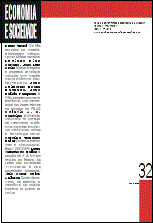Resumen
O artigo analisa as concepções de Mill sobre quais deveriam ser a forma de governo e o escopo de atuação do Estado na vida econômica e social. Argumenta-se que, segundo o autor, a resposta a essas indagações dependeria do tipo de sociedade em questão. Em sociedades ‘atrasadas’, por uma questão de imaturidade moral e intelectual da população, a forma mais adequada de governo seria o despotismo esclarecido e o escopo adequado de atuação do Estado na vida econômica e social seria bastante amplo. No caso de sociedades ‘civilizadas’, ao contrário, o regime político ideal seria a Democracia Representativa e o laissez-faire, em linhas gerais, seria a melhor política. Argumenta-se, ainda, que, apesar de Mill concluir que a Democracia Representativa e a liberdade econômica não seriam aplicáveis ou adequadas a todas as sociedades, estas tinham um peso importante na sua filosofia: representavam ideais a serem buscados.
Abstract
This paper analyses J.S. Mill’s conceptions on what would be the proper form of government and the proper scope of State intervention in economic life. It is argued that, for Mill, the answer depended on the type of society in question. In ‘backward’ societies, in which the population encountered itself in a very low state of moral and intellectual improvement, the adequate form of government would be enlightened despotism and the adequate scope of the State intervention in economic and social life very great. In ‘civilized’ societies, on the contrary, the ideal political regime would be the Representative Government, and laissez-faire, in general lines, the best policy. It is also argued that despite Mill’s conclusion that Representative Government and economic liberty would not be applicable or adequate to every kind of society, they had a great importance on his philosophy as ideals to be aimed at.
Key words: Mill, John Stuart. Laissez-fair.; Representative democracy. Development
Citas
COLLISON BLACK, R. D. Economic policy in Ireland and India in the time of John Stuart Mill. The Economic History Review, New Series, v. 21, n. 2, p. 321-336, 1968. COLLISON BLACK, R. D. The classical economists and the Irish problem. Oxford Economic Papers, New Series, v. 5, n. 1, p. 26-40, 1953.
EKELUND JR., R. B.; TOLLISON, R. D. The new political economy of J. S. Mill: the means to social justice. The Canadian Journal of Economics, v. 9, n. 2, p. 213-231, 1976.
________. J. S. Mill’s new political economy: another view. Originally published in Economic Inquiry, v. 16 n. 4, p. 587-592, Oct. 1978. Reprinted in J. S. Mill: critical assessments, ed. by J. C. Cunnighan Wood. London: Routledge, 1991. v. III.
HAMBURGER, J. Introduction. In: ROBSON, J. M. (Ed.). Collected works of John Stuart Mill. Toronto and London University of Toronto Press and Routledge & Kegan Paul, 1982. p.viii- liv, v. VI: Essays on England, Ireland and the Empire.
HARRIS, A. L. John Stuart Mill: servant of the East India company. Cambridge Journal of Economics, v. 30, May 1964. Reprinted in J. S. Mill: critical assessments, ed. by J. C. Cunnighan Wood. London: Routledge, 1991. p. 207-225.
________. John Stuart Mill’s theory of progress. Ethics an International Journal of Social, Political, and Legal Philosophy, v. LXVI , n. 3, 1956.
HOLLOWAY, H. Mill and the welfare state. The Western Political Quarterly, v. 13 n. 2, Jun. 1960, p. 389-405.
KURER, O. John Stuart Mill and the welfare state. History of Political Economy (HOPE), v. 23, n. 4, p. 713-730, 1991.
LEVY, D.; PEART, S. A disciple without sympathy: from median to mean well-being in economic analysis. 2003. Disponível em: <http://homepages.bw.edu/~speart/median_Imagesabstract_cje.pdf>.
MATTOS, L. V. Economia política e mudança social: a filosofia econômica de John Stuart Mill. São Paulo: Edusp, 1998.
MILL, J. S. [1834]. Remarks on Bentham’s philosophy. In: Collected works of John Stuart Mill. Toronto: University of Toronto Press, 1969. v. X.
________. [1836]. Civilization. In: Essays on politics and culture: John Stuart Mill, ed. by Gertrude Himmelfarb, Peter Smith, Gloucester, 1973.
________. [1848]. Principles of political economy with some of their applications to social philosophy. In: Collected works of John Stuart Mill. Toronto: University of Toronto Press, 1965. v. II, III.
________. [1859]. A few words on non-intervention. In: Essays on politics and culture: John Stuart Mill, ed. by Gertrude Himmelfarb, Peter Smith, Gloucester, 1973.
________. [1859]. A liberdade. In: A LIBERDADE; utilitarismo: John Stuart Mill. Trad. Eunice Ostrensky. São Paulo: Martins Fontes, 2000.
________. [1861]. Considerations on representative government. New York: The Liberal Arts Press, 1958.
________. [1865]. August Comte and positivism. In: Collected works of John Stuart Mill.Toronto: University of Toronto Press, 1969. v. X.
MILL, J. S. [1870]. Leslie on the land question. In: Essays on economics and society, 1850-1879. In: Collected works of John Stuart Mill. Toronto: University of Toronto Press, 1967.
MILLER, K. E. John Stuart Mill’s theory of international relations. Journal of the History of Ideas, v. 22, n. 4, p. 493-514, 1961.
MOIR, M. Introduction. In: Collected works of John Stuart Mill. Ed. by J. M. Robson, Martin Moir and Zawahir Moir. Routledge, Toronto and London: University of Toronto Press, 1990. p. vii-iv, v. XXX: Writings on India.
SCHWARTZ, P. La nueva economia politica de John Stuart Mill. Madrid: Tecnos, 1968.
SCHWEINITZ JR., K. John Stuart Mill and India. Research in the History of Economic Thought and Methodology, v. 2, p. 47-61, 1984.
SULLIVAN, E. P. Liberalism and imperialism: J. S. Mill’s defense of the British Empire. Journal of the History of Ideas, v. 44, n. 4, p. 599-617, 1983.
WEST, E. G. J. S. Mill’s redistribution policy: new political economy or old?. Originally published in Economic Inquiry, v. 16, n. 4, p. 570-586, Oct. 1978. Reprinted in J. S. Mill: critical assessments, ed. by J. C. Cunnighan Wood. Routledge, London, 1991. v. III.
ZASTOUPIL, L. Moral government: J. S. Mill on Ireland. Historical Journal, v. 26, n. 3, p. 707-717, 1983.
A Economia e Sociedade utiliza a licença do Creative Commons (CC), preservando assim, a integridade dos artigos em ambiente de acesso aberto.

